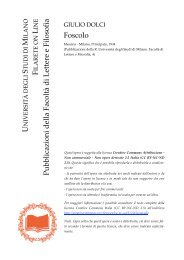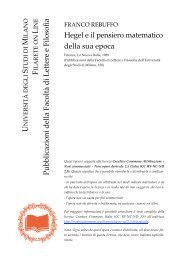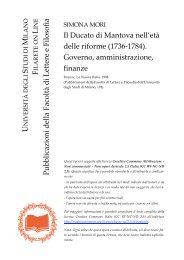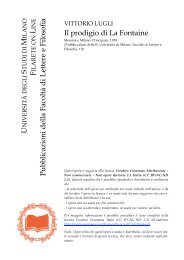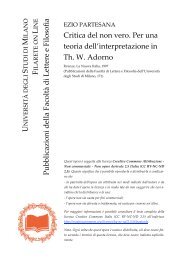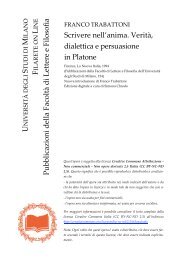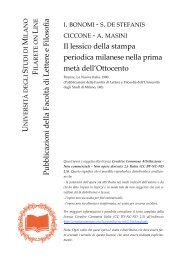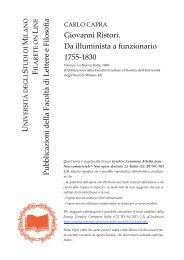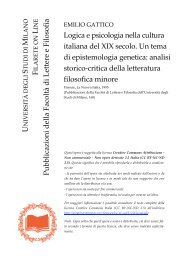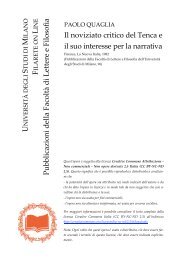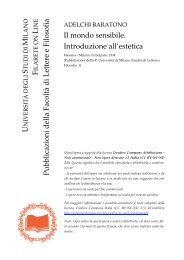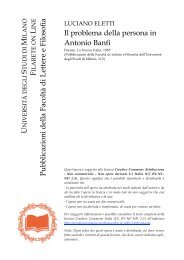- Page 1 and 2:
UNIVERSITÀ
DEGLI
STUDI
DI
- Page 3 and 4:
GIANCARLO CARABELLI HUME E LA RETOR
- Page 5 and 6:
PREFAZIONE Con questo lavoro ci sia
- Page 7:
PREFAZIONE IX ton (discusse rispett
- Page 11:
PARTE PRIMA LO STRUMENTO RETORICO
- Page 14 and 15:
LO STRUMENTO RETORICO vidono il Tre
- Page 16 and 17:
6 LO STRUMENTO RETORICO la sua rend
- Page 18 and 19:
LO STRUMENTO RETORICO vuto almeno i
- Page 20 and 21:
10 LO STRUMENTO RETORICO tore, fece
- Page 22 and 23:
32 LO STRUMENTO RETORICO contrasto
- Page 24 and 25:
LO STRUMENTO RETORICO l'autore auto
- Page 26 and 27:
16 LO STRUMENTO RETORICO Hamilton,
- Page 28 and 29:
LO STRUMENTO RETORICO ogni libro me
- Page 30 and 31:
20 L0 STRUMENTO RETORICO bilmente i
- Page 32 and 33:
22 LO STRUMENTO RETORICO oltre che
- Page 34 and 35:
CAPITOLO II I DIALOGUES COME OPERA
- Page 36 and 37:
26 LO STRUMENTO RETORICO Hume, teor
- Page 38 and 39:
28 LO STRUMENTO RETORICO sua doppia
- Page 40 and 41:
30 L0 STRUMENTO RETORICO dell'« in
- Page 42 and 43:
32 LO STRUMENTO RETORICO del « fil
- Page 44 and 45:
34 L0 STRUMENTO RETORICO Nel 1763,
- Page 46 and 47:
36 LO STRUMENTO RETORICO Resta quin
- Page 48 and 49:
38 L0 STRUMENTO RETORICO è la scel
- Page 50 and 51:
40 LO STRUMENTO RETORICO Account of
- Page 52 and 53:
42 LO STRUMENTO RETORICO due volte
- Page 54 and 55:
44 L0 STRUMENTO RETORICO principalm
- Page 56 and 57:
46 LO STRUMENTO RETORICO nivano «
- Page 58 and 59:
48 LO STRUMENTO RETORICO taccabile
- Page 60 and 61:
50 LO STRUMENTO RETORICO a giustifi
- Page 62 and 63:
52 LO STRUMENTO RETORICO pratica de
- Page 64 and 65:
54 LO STRUMENTO RETORICO costituì
- Page 66 and 67:
56 LO STRUMENTO RETORICO comunica2
- Page 68 and 69:
58 LO STRUMENTO RETORICO uomo di pa
- Page 70 and 71:
60 LO STRUMENTO RETORICO La prima s
- Page 72 and 73:
62 LO STRUMENTO RETORICO Filone 29,
- Page 74 and 75:
64 LO STRUMENTO RETORICO dall'altro
- Page 76 and 77:
66 LO STRUMENTO RETORICO lo scettic
- Page 78 and 79:
68 LO STRUMENTO RETORICO della dott
- Page 80 and 81:
Torniamo ora al testo dei Dialogues
- Page 82 and 83:
72 'LO STRUMENTO RETORICO Nella sto
- Page 84 and 85:
74 L0 STRUMENTO RETORICO non v'era
- Page 86 and 87:
76 L0 STRUMENTO RETORICO A rendere
- Page 88 and 89:
78 LO STRUMENTO RETORICO essere con
- Page 90 and 91:
80 L(J STRUMENTO RETORICO ne è una
- Page 92 and 93:
82 LO STRUMENTO RETORICO Ma agli in
- Page 94 and 95:
84 L0 STRUMENTO RETORICO (e cioè p
- Page 96 and 97:
86 L0 STRUMENTO RETORICO al genere
- Page 98 and 99:
LO STRUMENTO RETORICO bilità psico
- Page 100 and 101:
90 LO STRUMENTO RETORICO ma alla fi
- Page 102 and 103:
92 LO STRUMENTO RETORICO Lo scettic
- Page 104 and 105:
94 LO STRUMENTO RETORICO vare la so
- Page 106 and 107:
96 LO STRUMENTO RETORICO teresse pr
- Page 108 and 109:
98 LO STRUMENTO RETORICO della non
- Page 110 and 111:
100 L0 STRUMENTO RETORICO il precon
- Page 112 and 113:
102 L° STRUMENTO RETORICO Nella pr
- Page 114 and 115:
104 L0 STRUMENTO RETORICO rone sign
- Page 116 and 117:
106 LO STRUMENTO RETORICO I ragiona
- Page 118 and 119:
108 LO STRUMENTO RETORICO chiuso, p
- Page 120 and 121:
HO LO STRUMENTO RETORICO Oswald si
- Page 122 and 123:
CAPITOLO VI LA STRATEGIA DELLA DISC
- Page 124 and 125:
114 LO STRUMENTO RETORICO più astn
- Page 126 and 127:
LO STRUMENTO RETORICO debolezza uma
- Page 128 and 129:
118 LO STRUMENTO RETORICO rinunciar
- Page 130 and 131:
120 LO STRUMENTO RETORICO stia cond
- Page 132 and 133:
122 LO STRUMENTO RETORICO materia r
- Page 134 and 135:
124 L0 STRUMENTO RETORICO quali cer
- Page 136 and 137:
126 L0 STRUMENTO RETORICO sulta que
- Page 138 and 139:
128 L0 STRUMENTO RETORICO ritti for
- Page 140 and 141:
130 LO STRUMENTO RETORICO sostanzia
- Page 143:
PARTE SECONDA IL REFERENTE STORICO
- Page 146 and 147:
136 IL REFERENTE STORICO la vita de
- Page 148 and 149:
138 IL REFERENTE STORICO rabili; le
- Page 150 and 151:
140 IL REFERENTE STORICO metà del
- Page 152 and 153:
142 IL REFERENTE STORICO tender »
- Page 154 and 155: 144 IL REFERENTE STORICO portata ne
- Page 156 and 157: 146 IL REFERENTE STORICO meraviglia
- Page 158 and 159: 148 IL REFERENTE STORICO The Scotch
- Page 160 and 161: 150 1L REFERENTE STORICO ormai malf
- Page 162 and 163: 152 IL REFERENTE STORICO 30.000 per
- Page 164 and 165: 154 IL REFERENTE STORICO A rafforza
- Page 166 and 167: 156 1L REFERENTE STORICO una pubbli
- Page 168 and 169: 158 IL REFERENTE STORICO tura giri
- Page 170 and 171: 160 IL REFERENTE STORICO Se v'è un
- Page 172 and 173: IL REFERENTE STORICO Ali men... mus
- Page 174 and 175: 164 IL REFERENTE STORICO La cosidde
- Page 176 and 177: IL REFERENTE STORICO Può essere ut
- Page 178 and 179: 168 IL REFERENTE STORICO can be for
- Page 180 and 181: 170 IL REFERENTE STORICO vero fanat
- Page 182 and 183: 172 IL REFERENTE STORICO giudicare
- Page 184 and 185: 174 JL REFERENTE STORICO nevano che
- Page 186 and 187: 176 IL REFERENTE STORICO Ramsay in
- Page 188 and 189: 178 1L REFERENTE STORICO Cullen (17
- Page 190 and 191: 180 1L REFERENTE STORICO nodi dei D
- Page 192 and 193: 182 1L REFERENTE STORICO Ramsay, la
- Page 194 and 195: 184 IL REFERENTE STORICO sur les pr
- Page 196 and 197: IL REFERENTE STORICO some Hypothese
- Page 198 and 199: 188 1L REFERENTE STORICO publicatio
- Page 200 and 201: 190 IL REFERENTE STORICO moderate s
- Page 202 and 203: 192 IL REFERENTE STORICO Campbell e
- Page 206 and 207: 196 IL REFERENTE STORICO cezione de
- Page 208 and 209: 198 IL REFERENTE STORICO traterreni
- Page 210 and 211: 200 1L REFERENTE STORICO occupato i
- Page 212 and 213: 202 IL REFERENTE STORICO rule of pu
- Page 214 and 215: 204 IL REFERENTE STORICO tance with
- Page 216 and 217: 206 IL REFERENTE STORICO I bave giv
- Page 218 and 219: 208 IL REFERENTE STORICO temi della
- Page 220 and 221: 210 1L REFERENTE STORICO dei modera
- Page 222 and 223: 212 IL REFERENTE STORICO Un accenno
- Page 224 and 225: 214 IL REFERENTE STORICO zionalismo
- Page 226 and 227: 216 IL REFERENTE STORICO Filone, co
- Page 228 and 229: 218 1L REFERENTE STORICO sulla prov
- Page 230 and 231: 220 IL REFERENTE STORICO in opposiz
- Page 232 and 233: 222 IL REFERENTE STORICO phy » (p.
- Page 234 and 235: 224 IL REFERENTE STORICO plementari
- Page 236 and 237: 226 IL REFERENTE STORICO porary wri
- Page 238 and 239: 223 IL REFERENTE STORICO ci mostran
- Page 240 and 241: 230 IL REFERENTE STORICO Siamo all'
- Page 242 and 243: 232 IL REFERENTE STORICO le diffico
- Page 244 and 245: 234 IL REFERENTE STORICO condary, s
- Page 246 and 247: 236 1L REFERENTE STORICO ne avrebbe
- Page 248 and 249: 238 1L REFERENTE STORICO John Home
- Page 250 and 251: 240 1L REFERENTE STORICO di termini
- Page 252 and 253: 242 IL REFERENTE STORICO zese del '
- Page 254 and 255:
244 IL REFERENTE STORICO del '600 s
- Page 256 and 257:
246 IL REFERENTE STORICO cultura ch
- Page 258 and 259:
248 1L REFERENTE STORICO che riguar
- Page 260 and 261:
250 IL REFERENTE STORICO della scuo
- Page 262 and 263:
252 IL REFERENTE STORICO st'opera,
- Page 264 and 265:
254 IL REFERENTE STORICO b} l'inter
- Page 266 and 267:
256 IL REFERENTE STORICO l'ipotesi
- Page 268 and 269:
258 IL REFERENTE STORICO e) il prob
- Page 270 and 271:
260 IL REFERENTE STORICO ma distint
- Page 272 and 273:
262 IL REFERENTE STORICO tipo di ca
- Page 274 and 275:
264 IL REFERENTE STORICO i due part
- Page 276 and 277:
266 IL REFERENTE STORICO di lui una
- Page 278 and 279:
268 IL REFERENTE STORICO it is suff
- Page 280 and 281:
270 1L REFERENTE STORICO a priori e
- Page 282 and 283:
CAPITOLO XIII CLEANTE E L'IDEOLOGIA
- Page 284 and 285:
274 IL REFERENTE STORICO stica non
- Page 286 and 287:
276 IL REFERENTE STORICO cesso dell
- Page 288 and 289:
278 IL REFERENTE STORICO zio dell'8
- Page 290 and 291:
280 IL REFERENTE STORICO a Londra u
- Page 292 and 293:
282 IL REFERENTE STORICO E a legare
- Page 294 and 295:
284 IL REFERENTE STORICO tradiziona
- Page 296 and 297:
286 IL REFERENTE STORICO Questo car
- Page 299 and 300:
ADAM, Robert, 138. ADDISON, Joseph,
- Page 301 and 302:
CRAIG, D., 18 n., 138 n., 209 n., 2
- Page 303 and 304:
INNES, Alexander, 191 n. IRVING, Ed
- Page 305 and 306:
POTILE, F. A., 96 n., 150 n., 277 n
- Page 307 and 308:
WESLEY, John, 180 e n. WEST, G., 21



